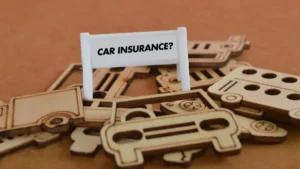When considering how to save on car insurance premiums, using a parent’s address might seem like an appealing option, especially for young drivers living in high-premium urban areas. But is it legal, ethical, or even worth the risk? This article dives deep into this common question while addressing another key query: “Does insurance cover car damage if it’s your fault?”
Why People Consider Using Their Parents’ Address
Many drivers, particularly young adults, find car insurance premiums exorbitant. Factors like location, crime rates, and accident statistics significantly influence these costs. For example, urban areas like North West London often attract higher premiums compared to more rural locations like leafy Suffolk. Drivers might be tempted to list their parents’ address as their primary residence, hoping to reduce their premiums.
The Legalities of Using a Parent’s Address for Car Insurance
Using your parents’ address for car insurance, especially when you don’t live there, can be risky and potentially fraudulent. Here’s what you need to know:
- Accuracy is Key
- Insurance policies are based on the car’s primary location, i.e., where it’s parked overnight. If your car resides at your urban apartment while your policy lists your parents’ rural address, you’re misrepresenting critical information.
- What Insurers Expect
- Insurers calculate premiums based on the car’s risk exposure. Misleading them could result in policy cancellation, denial of claims, or even legal consequences.
- Correspondence vs. Residence Address
- Some insurers allow a “correspondence address” (like a parent’s home) separate from the car’s primary location. However, this must be disclosed honestly, and the car’s overnight location should remain accurate.
- Potential Consequences of Misrepresentation
- If insurers discover inaccuracies during a claim investigation, they may:
- Refuse to pay out.
- Cancel the policy retroactively.
- Report the policyholder, affecting future insurance applications.
- If insurers discover inaccuracies during a claim investigation, they may:
Does Insurance Cover Car Damage If It’s Your Fault?
Car insurance can cover damages even if you’re at fault, but it depends on your coverage type. Here’s how it breaks down:
1. Comprehensive and Collision Coverage
- These policies typically cover damages to your vehicle in at-fault accidents.
- You will likely pay a deductible, and your premiums may increase post-claim.
2. Third-Party Liability
- This only covers damages or injuries caused to others. Your vehicle’s damages won’t be covered.
3. Factors Affecting Payout
- Deductibles: The amount you pay out-of-pocket before insurance kicks in.
- Policy Terms: Certain damages (e.g., wear and tear) may not be covered.
- Claims History: Frequent claims may label you as high-risk, raising future premiums.
When Misrepresentation Can Backfire
Imagine you list your parents’ address on your policy but live in a high-risk city. You get into an accident, and your insurer investigates:
- Claim Denied: The insurer finds the car is primarily parked in the city, not at the rural address listed.
- Policy Cancelled: This could lead to higher premiums and difficulties obtaining insurance elsewhere.
- Legal Consequences: Providing false information can result in insurance fraud charges.
Honesty Pays Off: Ethical Alternatives
Instead of risking fraud, here are some legal ways to save on insurance:
- Multi-Car Discounts
- Add your car to a family policy under your parents. This often reduces costs while maintaining transparency.
- Usage-Based Insurance
- Policies like telematics (or “black box” insurance) calculate premiums based on actual driving habits.
- Increase Your Excess
- Opt for a higher deductible to lower your monthly premium.
- Shop Around
- Use comparison tools to find the most affordable policy tailored to your actual location.
- Student Discounts
- If you’re a university student, some insurers offer reduced rates for limited annual mileage.
Steps to Take After an At-Fault Accident
If you’re involved in an accident and it’s your fault, here’s what to do:
- Stay Calm and Safe
- Move to a safe location and check for injuries. Call emergency services if necessary.
- Exchange Information
- Share insurance details with the other party. Avoid admitting fault on the spot.
- Document the Scene
- Take photos of the damage, road conditions, and any contributing factors.
- Contact Your Insurer
- Report the accident immediately. Honesty is crucial, even if you’re at fault.
- Follow Up
- Work with your insurer to understand repair timelines, coverage details, and potential premium increases.
Can I Use My Parents’ Address Temporarily?
If you genuinely live there temporarily (e.g., during holidays), it may be acceptable. However, ensure the car’s primary location is accurately disclosed.
Will My Insurance Cover All Damages?
This depends on your policy. Comprehensive insurance offers the broadest coverage, while liability-only covers damages to others.
How Do Claims Affect My Premiums?
Even non-fault claims can raise premiums, as insurers may view you as a higher risk.
What Happens If I Don’t Disclose a Previous Accident?
Failure to disclose can lead to claim denial and policy cancellation.
How Can I Check My Insurance History?
Visit the Claims and Underwriting Exchange (CUE) or the Motor Insurers Bureau for a detailed report.




